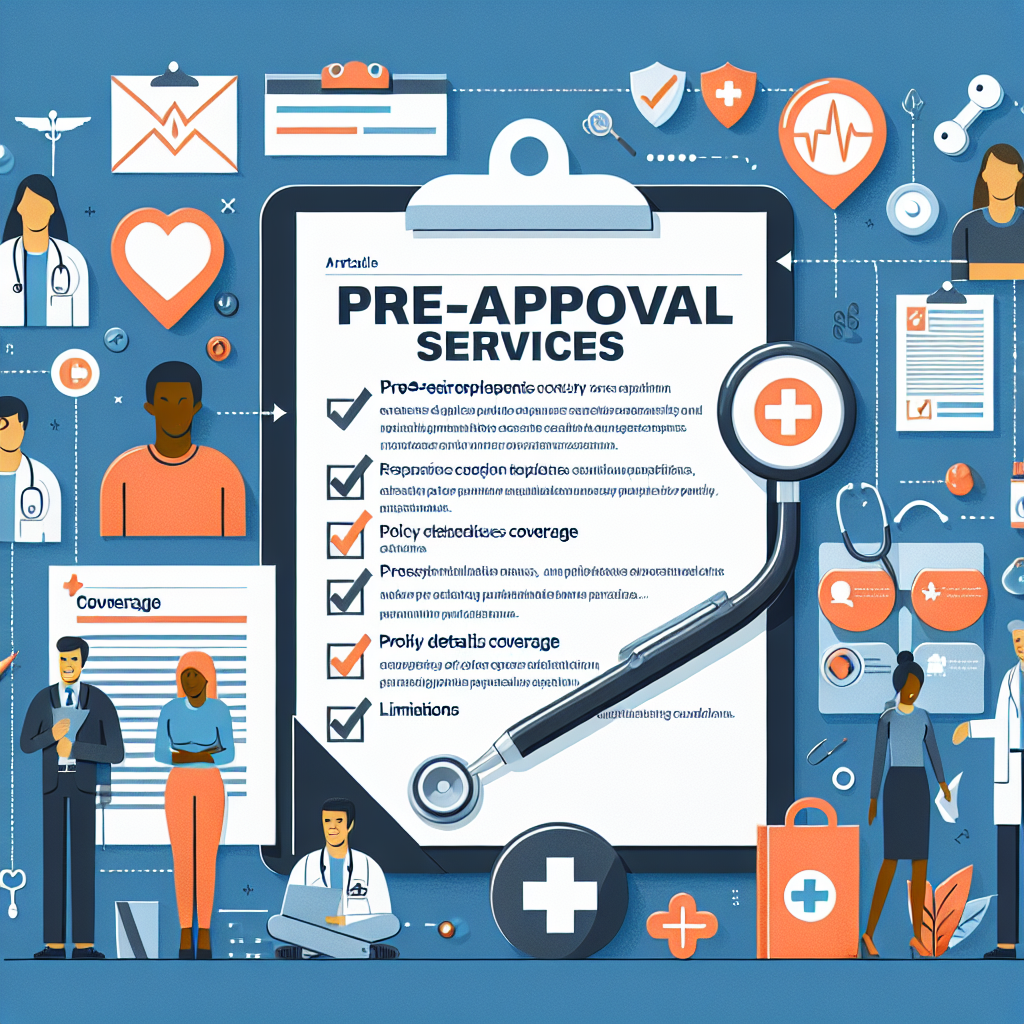Navigating the world of pre-existing conditions coverage can be complex and overwhelming, especially when it comes to understanding pre-approval services. In this article, we delve into the intricacies of pre-existing conditions coverage and shed light on the importance of pre-approval services. From defining what constitutes a pre-existing condition to explaining the process of obtaining pre-approval for services, we aim to provide clarity and guidance for individuals seeking coverage. Join us on this exploration of a crucial aspect of healthcare coverage and gain a deeper understanding of how pre-approval services can benefit you.
Importance of Pre-Existing Conditions Coverage

In the realm of health insurance, pre-existing conditions refer to any health issues or medical conditions that an individual has prior to obtaining insurance coverage. These conditions can range from chronic illnesses such as diabetes or heart disease to past surgeries or injuries. Understanding the importance of pre-existing conditions coverage is crucial in ensuring that individuals receive the necessary medical care without facing financial burdens or coverage limitations.
Definition of Pre-Existing Conditions
Pre-existing conditions are health issues that exist before the start date of a health insurance policy. These conditions can vary widely in severity and may include both physical and mental health ailments. From a health insurance perspective, pre-existing conditions can impact coverage eligibility, premium costs, and the extent of services that are covered under a policy. It is essential for individuals to disclose any pre-existing conditions when applying for health insurance to ensure that they receive appropriate coverage.
Challenges Faced by Individuals with Pre-Existing Conditions
Individuals with pre-existing conditions often encounter obstacles when seeking health insurance coverage. Insurers may view these individuals as high-risk policyholders, leading to higher premiums or coverage exclusions for certain conditions. This can result in financial strain and limited access to essential healthcare services for individuals with pre-existing conditions. Additionally, the fear of being denied coverage or facing significant out-of-pocket costs can deter individuals from seeking necessary medical treatment.
Significance of Pre-Existing Conditions Coverage in Health Insurance
The inclusion of pre-existing conditions coverage in health insurance policies is vital for promoting equitable access to healthcare. By providing coverage for pre-existing conditions, insurers ensure that individuals with chronic illnesses or medical histories can receive the care they need without facing excessive financial burdens. This coverage can encompass various services, including doctor visits, prescription medications, and specialized treatments related to pre-existing conditions. Moreover, pre-existing conditions coverage helps individuals manage their health conditions effectively, leading to improved overall well-being and quality of life.

Pre-Approval Services Explained
Pre-approval services in the realm of health insurance serve as a crucial step in the process of obtaining coverage for pre-existing conditions. These services are designed to assess and approve certain medical procedures, treatments, or medications before they are carried out. By obtaining pre-approval, individuals can ensure that their health insurance provider will cover the costs associated with their pre-existing conditions.
Definition of Pre-Approval Services
Pre-approval services involve a thorough review process conducted by the health insurance company to determine the medical necessity and appropriateness of the proposed treatment or procedure. This review helps prevent unnecessary expenses and ensures that the individual receives the care they need in a timely manner.
How Pre-Approval Services Work in the Context of Health Insurance
When an individual with a pre-existing condition requires a specific medical intervention, their healthcare provider submits a request for pre-approval to the insurance company. The insurer then evaluates the request based on medical guidelines and policy coverage. If the treatment is deemed necessary and falls within the coverage terms, the insurer approves the pre-authorization, allowing the individual to proceed with the recommended care.
Benefits of Pre-Approval Services for Individuals with Pre-Existing Conditions
- Financial Protection: Pre-approval services provide financial protection by ensuring that the costs of necessary treatments for pre-existing conditions are covered by insurance.
- Streamlined Process: By obtaining pre-approval, individuals can streamline the process of receiving medical care, reducing delays in treatment and administrative hassles.
- Clarity on Coverage: Pre-approval offers clarity on what services are covered by insurance, helping individuals with pre-existing conditions better understand their benefits and plan their healthcare needs effectively.
Coverage Options for Pre-Existing Conditions
When it comes to coverage options for pre-existing conditions, individuals often find themselves navigating a complex landscape of insurance policies and regulations. Understanding the nuances of these coverage options is crucial for ensuring adequate protection and financial security in the face of existing health conditions.
Types of Coverage Available for Pre-Existing Conditions
- Guaranteed Issue Policies: These policies are designed to provide coverage regardless of pre-existing conditions. While they may come with higher premiums, they offer a valuable option for individuals with significant health concerns.
- Underwritten Policies: These policies involve a thorough evaluation of an individual’s health history, which may result in exclusions or higher premiums for pre-existing conditions. However, they can provide comprehensive coverage for other health needs.
- State High-Risk Pools: Some states offer high-risk pools for individuals with pre-existing conditions who are unable to obtain coverage through traditional means. These pools often come with specific eligibility criteria and may involve higher costs.
Limitations and Exclusions to Pre-Existing Conditions Coverage
- Waiting Periods: Many insurance policies impose waiting periods before coverage for pre-existing conditions kicks in. During this time, individuals may have limited or no coverage for expenses related to their existing health conditions.
- Excluded Services: Some policies may exclude specific treatments or services related to pre-existing conditions, requiring individuals to cover these costs out-of-pocket.
- Annual Maximums: Insurance plans may impose annual maximums on coverage for pre-existing conditions, leading to potential gaps in care if expenses exceed these limits.
Understanding the Role of Pre-Approval Services in Enhancing Coverage Options
Pre-approval services play a critical role in ensuring that individuals receive the necessary authorization for medical treatments and procedures related to their pre-existing conditions. By obtaining pre-approval, individuals can navigate insurance coverage more effectively, minimize out-of-pocket costs, and access the care they need in a timely manner.
The Process of Pre-Approval for Services
When it comes to pre-approval for services related to pre-existing conditions, understanding the process is crucial to ensure coverage and timely access to necessary treatments. The steps involved in obtaining pre-approval typically include:
- Consultation with Healthcare Provider: The first step usually involves consulting with your healthcare provider to determine the necessary services or treatments for your pre-existing condition. Your healthcare provider will recommend services based on your medical history and current health status.
- Submission of Documentation: Once the recommended services are identified, the next step is to submit relevant documentation to the insurance provider for pre-approval. This documentation may include medical records, test results, treatment plans, and any other pertinent information to support the necessity of the services.
- Review Process: The insurance provider will then review the submitted documentation to assess the medical necessity of the requested services. This review process is essential to determine whether the services align with the terms of coverage outlined in your insurance policy.
- Approval or Denial: Based on the review, the insurance provider will either approve or deny the pre-approval request. If approved, you can proceed with the recommended services knowing that they will be covered by your insurance. If denied, you may have the option to appeal the decision or explore alternative options for treatment.

Adhering to the pre-approval process is vital to avoid potential issues with coverage and ensure that you receive the necessary treatments for your pre-existing condition. Common misconceptions about pre-approval services often revolve around the belief that the process is cumbersome or unnecessary. However, understanding and following the pre-approval process can ultimately save time, money, and unnecessary stress in navigating healthcare services.
Tips for Maximizing Pre-Approval Services
When it comes to navigating the complexities of pre-approval services for pre-existing conditions, there are several key strategies that can help individuals ensure they receive the coverage they need. Here are some tips for maximizing pre-approval services effectively:
- Understanding the Pre-Approval Process: Before diving into the pre-approval process, it is crucial to have a clear understanding of the requirements and procedures involved. Familiarize yourself with the documentation needed, the timeline for approval, and any specific criteria that apply to pre-existing conditions.
- Collaborating with Healthcare Providers: Building a strong relationship with your healthcare providers can significantly aid in the pre-approval process. Physicians can provide valuable insights into the medical necessity of treatments for pre-existing conditions, which can strengthen your case during the pre-approval review.
- Thorough Documentation: Ensure that all medical records, test results, treatment plans, and relevant documentation related to your pre-existing condition are organized and up-to-date. Comprehensive documentation can support your pre-approval request and expedite the approval process.
- Advocating for Yourself: Don’t hesitate to advocate for your healthcare needs during the pre-approval process. Clearly communicate with your insurance provider, highlighting the importance of the treatment for managing your pre-existing condition. Being proactive and persistent can make a significant difference in securing pre-approval for necessary medical services.
- Seeking Clarification: If you encounter any challenges or uncertainties during the pre-approval process, don’t hesitate to seek clarification from your insurance provider. Understanding the reasons for potential denials or delays can help you address any issues promptly and work towards obtaining the pre-approval you need.
- Utilizing Pre-Approval Resources: Take advantage of any resources or support services offered by your insurance provider to assist with the pre-approval process. These resources can provide guidance on navigating pre-existing conditions coverage, clarifying policy details, and addressing any concerns that may arise during the approval process.
By implementing these tips and strategies, individuals can maximize their pre-approval services utilization for pre-existing conditions, ensuring comprehensive coverage and timely access to necessary medical treatments.
Innovations in Pre-Approval Services for Pre-Existing Conditions
In recent years, there have been significant advancements in pre-approval services tailored specifically for individuals with pre-existing conditions. These innovations aim to streamline the process of obtaining approval for necessary medical treatments and services, ensuring that individuals with pre-existing conditions receive timely and appropriate care.
- Personalized Approaches: One of the key innovations in pre-approval services is the shift towards more personalized approaches. Instead of relying solely on standardized criteria, insurers are increasingly taking into account the unique medical histories and needs of individuals with pre-existing conditions. This personalized approach helps ensure that approvals are based on individual circumstances rather than broad guidelines.
- Streamlined Processes: Technology plays a crucial role in the streamlining of pre-approval services. Automated systems can now quickly process and review pre-approval requests, reducing the time it takes for individuals to receive a decision. This not only enhances efficiency but also allows for faster access to necessary treatments for those with pre-existing conditions.
- Real-Time Decision Making: Another innovation in pre-approval services is the shift towards real-time decision-making. Through the use of advanced algorithms and data analytics, insurers can now make more accurate and timely decisions regarding pre-approval requests. This real-time approach minimizes delays in accessing care, particularly for individuals with pre-existing conditions who may require immediate medical attention.
- Collaborative Care Models: Many pre-approval services now incorporate collaborative care models that involve healthcare providers in the decision-making process. By facilitating communication between insurers, healthcare providers, and patients, these models ensure that pre-approval decisions are made in a holistic manner, taking into account the expertise of medical professionals treating individuals with pre-existing conditions.
- Predictive Analytics: Advancements in predictive analytics have also revolutionized pre-approval services for pre-existing conditions. By analyzing data trends and patterns, insurers can better predict the healthcare needs of individuals with pre-existing conditions, allowing for proactive pre-approval measures to be put in place. This proactive approach can help prevent complications and ensure timely access to necessary treatments.
These innovations collectively contribute to a more efficient and effective pre-approval process for individuals with pre-existing conditions, ultimately leading to improved healthcare outcomes and better quality of life for those facing chronic health challenges.
FAQs: Pre Existing Conditions Coverage for Pre-Approval Services
What is considered a pre-existing condition when it comes to health insurance coverage for pre-approval services?
A pre-existing condition is any health issue that you have been diagnosed with or received treatment for before obtaining health insurance coverage. Insurance companies may have specific criteria and timelines for what qualifies as a pre-existing condition, so it’s important to review your policy for clarification.
Will my pre-existing condition be covered for pre-approval services under my health insurance plan?
The coverage of pre-existing conditions for pre-approval services varies depending on your specific health insurance policy. Some plans may provide coverage for pre-existing conditions, while others may have restrictions or limitations. It’s essential to review your policy carefully and consult with your insurance provider to understand what is covered.
How can I obtain pre-approval services for my pre-existing condition?
To obtain pre-approval services for your pre-existing condition, you will typically need to follow the processes outlined by your health insurance provider. This may involve submitting a request for pre-approval, providing medical documentation of your pre-existing condition, and receiving approval from your insurance company before receiving services.
Are there any additional costs associated with pre-approval services for pre-existing conditions?
The cost of pre-approval services for pre-existing conditions can vary depending on your health insurance plan. Some policies may require you to pay a co-payment or deductible for these services, while others may cover them entirely. It’s important to review your policy and speak with your insurance provider to understand any potential costs associated with pre-approval services for pre-existing conditions.
How can I appeal a denial of coverage for pre-approval services for my pre-existing condition?
If your health insurance provider denies coverage for pre-approval services related to your pre-existing condition, you have the right to appeal their decision. You can typically file an appeal directly with your insurance company, providing additional information or documentation to support your case. It’s essential to follow the appeals process outlined in your policy and advocate for your right to receive the necessary services for your pre-existing condition.